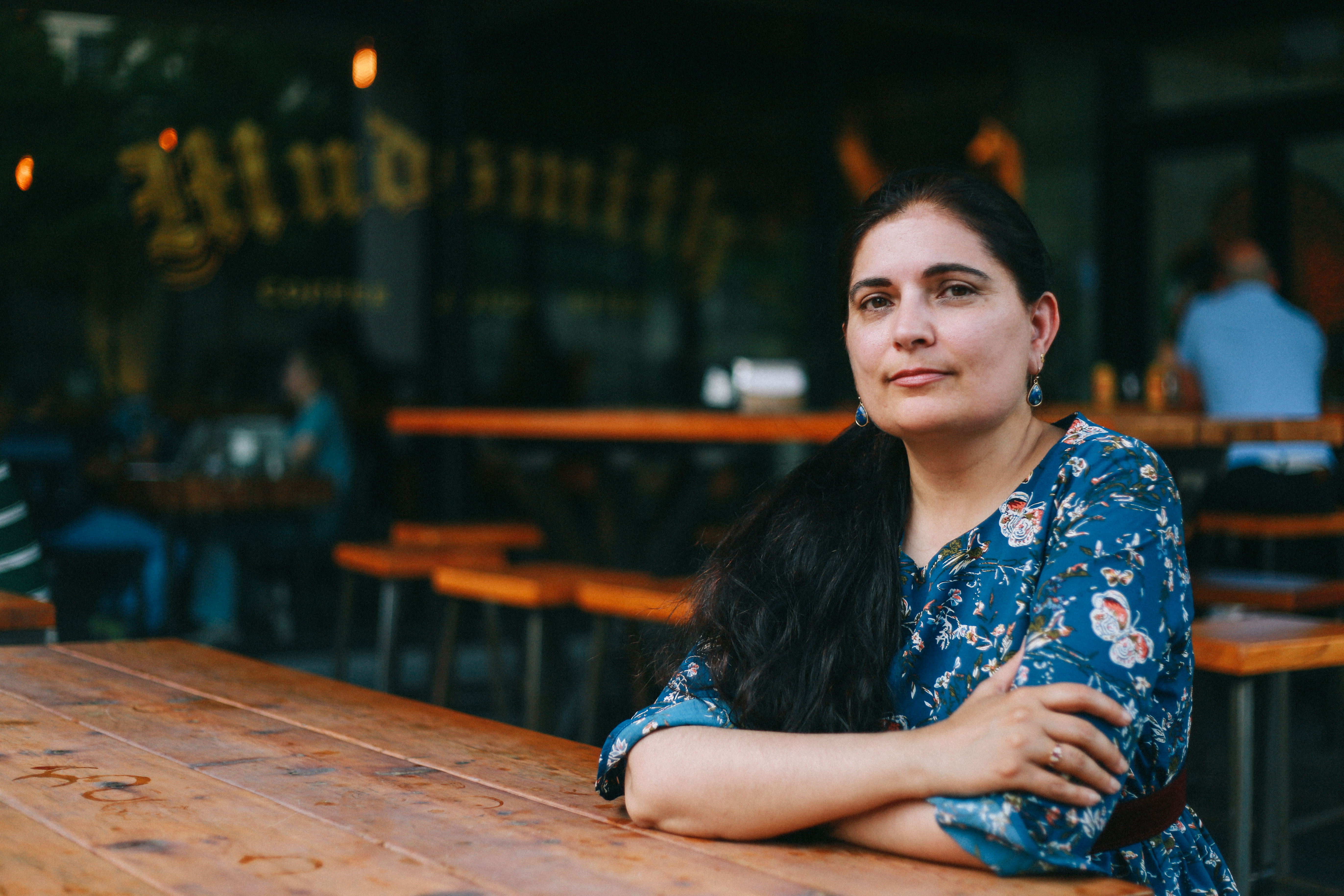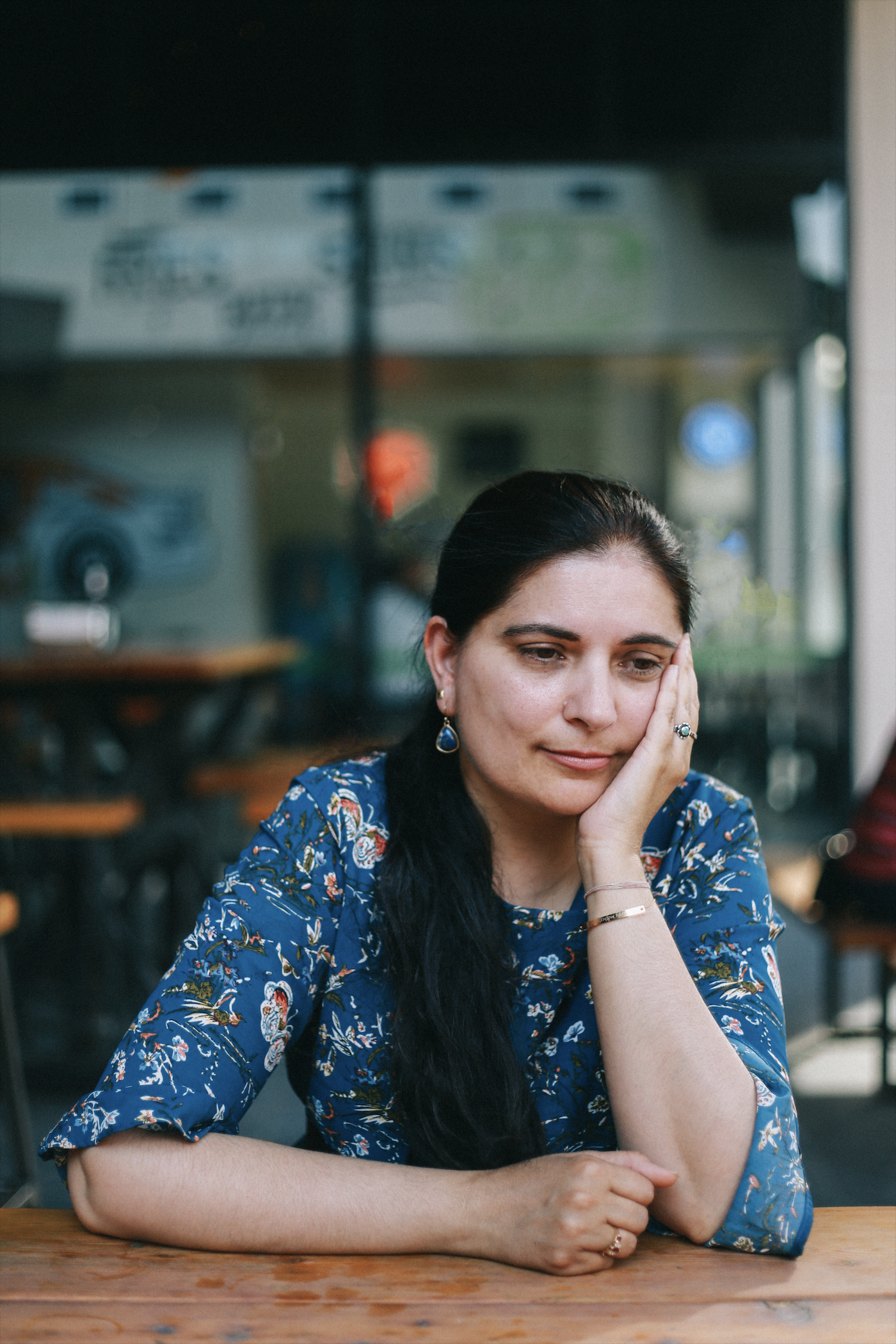
Last month, I had the privilege of speaking with Nikita Hattangady after meeting her at the DFW South Asian Film Festival (SAFF) earlier in May. Hattangady, a jack-of-all-trades when it comes to everything related to engineering and filmmaking, is the writer and director of Falafel, a short film about a woman whose chance meeting with a man in a café changes her life. Situated at a wooden table right outside Mudsmith’s on a warm but breezy summer day, she and I discussed everything from the benefits of dabbling in multiple disciplines to Falafel’s British origin and how you can make even Dallas, Texas look like London.
LT: It’s so great to see you again. When we met at SAFF, you had mentioned that you were an engineer. How did you transition from engineering to filmmaking?
NH: I worked for Nortel for some years and then I worked for Ericsson in Richardson, but I started taking acting lessons when my kids were toddlers. At the same time, I studied different aspects of filmmaking. For example, I took some writing courses, studied light and sound, and also took online courses on directing.
LT: And this is on top of your engineering day job and being a full-time mother?

NH: No, I had quit my engineering job by then, but I was a full-time mom. Whenever they went to bed, I researched everything about filmmaking. I was actually working as an assistant director on a film and I got fired from the job because I had gone out of town before we started filming. Prior to leaving, I told the team, “I'm going to be gone for four days. I can't do any work because we're going to be up in the mountains snowshoeing. I’ll have no access to my phone.” When I came back, they said, “You are so difficult to reach, so we're firing you.” And I was so sad. I was really down that day. So, my kids said, “Why do you keep working for other people? Why don’t you make your own film?” I thought, “That’s a wise idea…” I had written a short story a year prior and then I rewrote that short story as a script. I worked on that script more and more and it became a feature. I wanted to fund my feature, which took me to India in 2017 because the film is based in Mumbai, and a lot of people said they would help me, but no one would give me money. I thought, “Okay, so what do I do now?” One of the people who gave me advice was actor Rupert Ginn, who came to the festival because he was in a film, and he said, “Shouldn’t you first make a short film on your own even though you already have some experience? Why would anyone give you money?” And I was really annoyed with him, but you know what? He was right. (laughs) I had a little bit of money on the side and started contacting different people. And the funny thing is that before I had anybody on my cast or crew, I already had a song for the montage. I just heard some Spanish guitar music and I said, “I don't know who's going to be in the film, but I have to have that song.” I got it for a really cheap price and I just started working from there. Now we are in post-production. We’re actually doing our graphic work, so once that's done then we’re going to do sound and color-grading and then we're going to be ready to go.
LT: And what is the timeline looking like?
NH: I think we will be ready sometime in September because we should be getting all our graphic work done by end of July.
LT: That's so exciting. So, the first aspect that you had in mind was the song. What pulled you to it? Are you involved with music?
NH: When I was growing up, I was doing a lot of Indian folk dance and choreography. I also learned classical Indian music, but I'm not a performer. I'm a jack of many trades. I learned a lot of little things and I used to wonder if there was something wrong with me, like “Why am I pulled in so many directions?” until I finally realized: I'm not a great performer, but I know what great music sounds like. I'm a trained actor and even though I now don't want to go out and be an actor, I know what an actor needs to do. And even though I'm not a photographer or a cinematographer, I studied enough to know what good cinematography looks like. Right? So that helps me be the director.
LT: So, all those interests amounted to your passion for directing films and orchestrating a production!
NH: Absolutely. I did project management when I was working as an engineer, so I love leading a team and saying, “Hey, this is my vision.” You know, getting experts together to make that into a reality. I know how to pick good people, and occasionally I will pick someone that someone else has recommended because I’m the new kid on the block. I've worked as an assistant director, I've done some acting and all that, but when you actually sit down to produce a film it is a whole ‘nother ballgame.
LT: How did the idea for Falafel come about?
NH: The day that I started writing, I was not feeling well. I was lying in bed and I said, “Okay, I'm going to write a story about this woman who is just miserable.” And I asked myself, “Do I want to make her sick?” No…So I started writing about a girl confused about her career, which was kind of like me because I was in engineering then I tried acting and then I wanted to make a movie. About three to four hours later, I had a script about a girl who experiences a miserable morning and goes into a cafe and meets a guy. And I honestly just let it flow because Cathryn Hartt, who’s with Hartt and Soul Productions in Dallas, taught us how to get into a creative zone through a meditative practice. And I did that and said, “Whatever comes to mind, I'm just going to write it.” And I was surprised that a cute little story was a result of that.
LT: I read in your synopsis that the story takes place in London, but you filmed in Dallas. What was that process like?
NH: If you look around, there are buildings all over Dallas, Richardson, Frisco, and McKinney that will remind you of different locations across the world. I took some time to drive around and talked to my DP and I said, “Look, I have all these places and I’ve selected some for us to check out.” We planned an afternoon where we took our actors, me, my DP, and an assistant camera to the locations and we just shot.
LT: Were you married to the idea of London?
NH: It didn’t have to be London, but my humor was so British in the story that it just couldn't have been Dallas, you know? In order for people to understand the nuances of that subtle humor, it had to be in a British accent. I tried envisioning people saying that with a Texan accent and it just wasn’t as funny. And cost-wise, even with graphics and all the other factors, the entire budget was better than if I actually went to London to shoot. Just the establishing shots would have cost me more than the final budget of the film.
LT: I want to revisit what you had mentioned about nuanced British humor. Where did that stem from? Did you grow up watching British performances?
NH: Well, I'm originally from India and when you read newspapers or see theatrical performances, they like to be very British because India was a British colony. And if you go to Bombay, they have a train station called Victoria Train Station and the whole area looks like England. When I got married, my husband's favorite show was Faulty Towers. He used to make me watch that all the time. It was British humor and we would watch the show over and over again that after a while I found it funny, too.
LT: You’ve written a number of scripts now; do they all consist of British humor or was it just this one?
NH: No, it’s just this one, but I do like international things. I have short stories that I’ve written that I also want to develop into scripts. I have one that's set in Naples, one that's set in Japan.
LT: I can’t wait for you to develop those stories. I know you love directing and managing projects, but is there any aspect of filmmaking that really calls to you? Whether that's screenwriting, cinematography, acting, etc.
NH: Well, I wouldn’t want to be a full-time producer. There’s just too much paperwork involved. It's not the creative side, it's the business side. The part that I really, really enjoy is the actual production. I love telling stories. I love writing. I love working with my actors up to the day of production. The whole process of executing that vision is so much fun. To be able to pull an entire team of talented people together is so exciting for me. The opportunity to shoot a film and yell “Action!” and “Cut” is what’s feeding my joy right now.
LT: That’s great to hear. Do you want to give a shout-out to anyone? For example, any mentors or organizations who you feel have contributed to your growth and success up until this point?
NH: Definitely. There are so many people! My family is my inspiration. They put up with me and are always by my side encouraging me. Cathryn Hartt taught me how to act and how to lean into my creative side. Everything she taught me helps when I'm working with my actors. My friend Dawn Sawyer has been a big support in getting me on my path. My DP, Michael Bradley introduced me to all my other crew members. My incredible cast and crew of Falafel get applause. But most of all, I want to thank my mentor, Hollywood producer Stephen Simon, who has been guiding me throughout the process of film-making from writing to directing to producing. His guidance is invaluable, and I couldn’t have made a film without a rock like him by my side every step of the way.
This interview has been edited for clarity.
No comments.